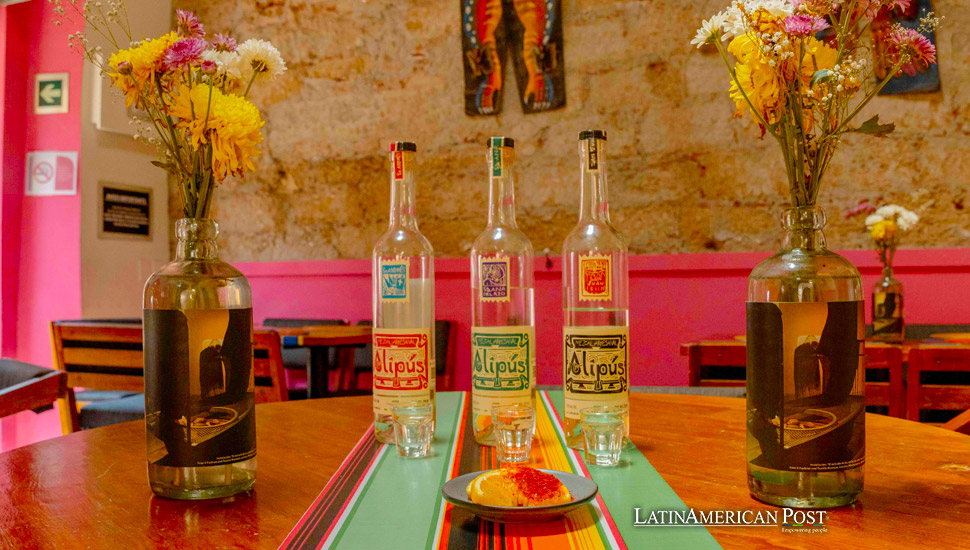Can Mexico’s Mezcal Survive?

A Smithsonian’s report highlights how climate change, corporate influence, and soaring demand put Mexico’s mezcal industry at a crossroads. As mezcal producers strive to meet global demand, they must also navigate environmental challenges to protect this beloved beverage’s future.
Santa Catarina Minas, a village tucked away 25 miles south of Oaxaca City, may not catch the eye of a casual traveler with its modest streets, small church, and sparse shops. But this quiet town has a special place in the hearts of mezcal lovers worldwide. Known as the “cradle of mezcal,” the region is home to some of the most revered agave distillates in Mexico, with a long history of mezcal production deeply rooted in tradition.
At Real Minero, one of the village’s most renowned distilleries, the diversity of agave species growing in their garden reflects the complexity and richness of mezcal. These plants—ranging from the slender cruise to the stout tobalá—imbue mezcal with their distinct flavors, influenced by the dry mountain climate of the region. Matías Domínguez Laso, a consulting biologist at Real Minero, describes their efforts to recreate the agave’s natural environment. “We brought the mountain here to recreate the environment where these agaves grow in the wild,” he told The Smithsonian during a property tour.
According to The Smithsonian, as mezcal gains global recognition, production has skyrocketed by 700% over the last decade. However, this explosive growth is not without its problems. Climate change, corporate pressures, and environmental degradation threaten the existence of mezcal as we know it. At the heart of this issue lies the question: Can mezcal distillers balance sustainability with increasing global demand?
Santa Catarina Minas: The Cradle of Mezcal
The process of making mezcal has changed little over the centuries. Agave plants are harvested, slow-roasted in underground pits, crushed by stone wheels, and fermented in large wooden barrels before being distilled into the final spirit. This ancient tradition has been passed down through generations in regions like Santa Catarina Minas, where mezcal is as much a cultural product as it is an economic one.
Graciela Ángeles Carreño, a fourth-generation mezcalera, runs Real Minero after her father’s passing in 2016. She spoke to The Smithsonian about the pride of maintaining her family’s legacy while confronting modern challenges. “We’re losing what made Oaxaca different from other regions—our focus on traditions, culture,” Ángeles Carreño lamented.
As demand for mezcal grows, so does the temptation to abandon time-honored practices in favor of more industrialized production. Many distilleries now rely on genetically identical espadín agave clones to meet the market’s voracious appetite for mezcal. This is efficient, but it raises concerns about the long-term sustainability of mezcal production and its environmental impact on Oaxaca’s delicate ecosystem.
Agave and the Vital Role of Bats in Mezcal
One key player in the sustainability of mezcal is often overlooked: the lesser long-nosed bat. For thousands of years, these bats have pollinated agave plants, which rely on them to reproduce. But as mezcal production becomes more industrialized, fewer agave plants are left to flower, breaking the cycle that has sustained both the agave and the bats for millennia.
“We are seeing a disruption in the relationship between agave plants and their pollinators due to climate change,” explains Rodrigo Medellín, Mexico’s foremost bat biologist, in his interview with The Smithsonian. “Without bats, there would be no agave.”
The connection between bats and mezcal production is a 10-million-year-old story, says Medellín, a co-author of Agave Spirits: The Past, Present, and Future of Mezcals. Agave plants invest every ounce of their energy into producing a towering reproductive stalk, a quote, just before they die. These flowering stalks attract bats, which spread the plant’s genetic material as they move from one agave to the next. However, with fewer quotes being allowed to bloom due to the demands of modern mezcal production, bats are increasingly finding themselves without their primary food source.
While bats have made a comeback thanks to conservation efforts, the relationship between mezcal producers and nature remains fragile. The rise of cloned agave species threatens biodiversity and makes the plants more vulnerable to disease. “Mother plants that have been cloned repeatedly are becoming smaller and less hardy,” says Domínguez Laso. Propagating by seed, we end up with more robust, complex plants.”
Corporate Pressures and the Risks of Industrialization
As mezcal’s popularity has grown, so has the interest of corporate players looking to capitalize on its success. However, with corporate money comes corporate practices, and the mezcal industry faces the same challenges that other traditional industries have encountered when scaling up.
The shift towards mass production has brought with it environmental concerns. “Wide-scale planting of espadín clones is leading to clear-cut hillsides, intensive farming, and increased use of pesticides and herbicides,” writes The Smithsonian. These practices are placing significant strain on Oaxaca’s ecosystem, depleting water resources and causing deforestation in a region that has relied on sustainable farming practices for centuries.
Additionally, the homogenization of agave plants in Oaxaca mirrors the challenges tequila producers face in Jalisco. In the late 1980s, an agave blight decimated tequila crops, and a similar outbreak could prove disastrous for mezcal producers reliant on cloned plants. “If we don’t diversify our agave crops, we risk repeating the mistakes of the tequila industry,” warns Gary Paul Nabhan, an ethnobotanist and co-author of Agave Spirits.
Despite these challenges, corporate interests are not entirely at odds with sustainability. Some more prominent mezcal brands, like Del Maguey, have committed to preserving traditional production methods while scaling up. As The Smithsonian notes, Del Maguey founder Ron Cooper partnered with local distillers to bottle and export their mezcal while maintaining the authenticity of their practices. However, the involvement of multinational spirits companies like Pernod Ricard, which acquired Del Maguey in 2017, has raised questions about the future of small-scale production.
Balancing Tradition and Sustainability
For mezcal producers like Real Minero and Lalocura, the answer to sustainability is returning to the roots of mezcal production. “Promoting mezcal is destroying real mezcal,” says Eduardo “Lalo” Ángeles, founder of Lalocura and brother of Graciela Ángeles. Lalo has committed to sustainable practices, creating a self-sustaining system where he grows his agave, raises cattle for fertilizer, and uses adobe bricks made from agave fibers to construct his distillery.
Producers like Lalocura and Real Minero are leading the way in showing how mezcal production can coexist with environmental stewardship. However, scaling these practices across the industry requires cooperation between corporate stakeholders, government agencies, and mezcaleros. The mezcal boom has brought economic opportunities to Oaxaca but has also come at a cost. The challenge is finding a way forward that balances growth with sustainability.
In the meantime, initiatives like the “bat-friendly” certification, developed by Medellín and tequila importer David Suro Piñera, offer a glimmer of hope. The program certifies mezcal and tequila producers who allow at least 5% of their agave plants to flower, ensuring that bats can continue pollinating them. While only a handful of producers have signed on so far, it’s a step in the right direction towards preserving the ecological balance that mezcal depends on.
Also read: Mexico’s First Zero-Waste Restaurant Leads a Sustainability Revolution
The stakes couldn’t be higher as Oaxaca’s mezcal industry continues to evolve. For mezcaleros like the Ángeles family, the future of their craft depends on striking the right balance between tradition and innovation. As The Smithsonian reports, the question now is whether the mezcal industry can rise to the sustainability challenge—or whether it will fall victim to the pressures of modernity.





